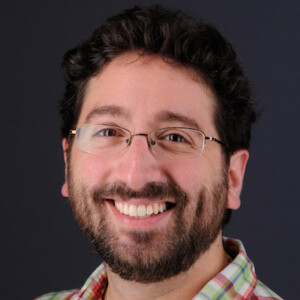
Tuesday Feb 18, 2025
Episode 88: Dr. Samuel Brody wrote about religious Zionism
Israel and Zionism: Could I have picked a hotter topic? Well, cool your jets, man.
Sam Brody, PhD, an associate professor of religious studies at University of Kansas, is going to bring a nuanced view of Zionism, theology, politics, and the ever-in-the-news dilemma of the nation-state of Israel by exploring an early thinker on the topic who’s most famous these days in bookstores for his religious work alone: Martin Buber.
If there are terms you don’t get as you listen, stop and look them up. It’s not too deep. Then, bask in Brody’s thoughts on the evolving thinking of Buber, whom he says brings an “anarchist” reading to the Bible to support his ideas about what kind of people the Jews are and what kind of place Israel could be.
His book is Martin Buber’s Theopolitics (what a fantastic word!), published in 2018 by Indiana University Press. Sure, the academic hardback is $90, but the ebook is only $9.99. Don’t be a cheapskate.
When I asked what people completely new to Buber should dig into first—how they should order their first dive into the life and ideas of this empathetic Jewish philosopher famous for his ideas on relational thinking—he recommends some books at the tail end of the podcast (before Brody’s recommendations, I recommend you read a way-too-short and over-simplified snapshot about Buber here, and if you’re into philosophy, head here):
- I and Thou, in many old and new versions all over, here in a 100th anniversary reissue
- Buber’s Hasidic stories (here or here, all available in earlier cheaper editions, too) about the great Eastern European rabbis—and the first of them, the Ba’al Shem Tov—from the past few centuries who focused on making Judaism more attainable and emotional overly scholarly and intellectual
- Thinker Paul Mendes-Flohr, of blessed memory—either reading his book on Buber or watching a talk he gave about the book in synagogue
- “Then after that,” Brody says in our interview, “you can read my book.”
After speaking to Brody, I think about the clash of politics and theology in a way, way different way. So this interview was, without exaggerating, eye-opening and mind-shifting for me.
May it be for you, too!
No comments yet. Be the first to say something!